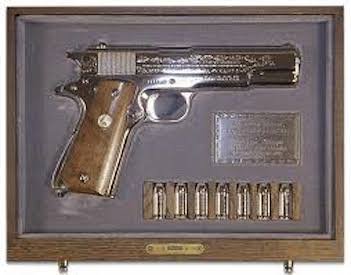When Elvis Met Nixon
The movie Elvis & Nixon will be released next month. Directed by Liza Johnson, it tells the story behind the most requested photo from the US National Archives, of the meeting between Elvis Presley and President Richard Nixon on December 21, 1970. The encounter was as improbable as it is iconic.
After a fight with both his wife and father over his spending on Christmas presents ($100,000 on 32 handguns and 10 Mercedes-Benzes — think about that next time you play Elvis’s Christmas album), Elvis went to the airport in a fit of pique and took the next available flight, fortuitously to Washington, DC. Although he thought better of it and subsequently flew to his house in Los Angeles, merely being in DC had given him an idea. Grabbing a Colt .45 pistol that was framed in a display case on a wall of the mansion, Elvis flew back to Washington.
On the flight, Elvis wrote a hasty letter to the President asking to be a ‘Federal Agent at Large’ for the Bureau of Narcotics and Dangerous Drugs. He was travelling with a number of guns and his collection of police badges. He was after more than another badge, however, as he thought, his wife Priscilla later recalled, that the Narcotics badge would allow him to travel anywhere he wanted with as many drugs and guns as he liked. In any case, he hand-delivered a letter to the White House at 6:30 am with an offer to help combat drugs, giving the address of his hotel, where he was registered under the name of John Burrows.
Fortunately for Elvis, the letter went to Egil ‘Bud’ Krogh. Krogh was a huge Elvis fan and urged Nixon to meet him, saying it would be good for his image with the ‘kids’. The meeting was arranged and Elvis showed up to the White House, armed at least with the Colt 45 – which was however confiscated by the Secret Service.
King resplendent in purple
The black and white photograph cannot convey this, but Elvis was resplendent in a purple velvet suit with a giant gold belt buckle, clearly visible in the picture. Nixon, briefed by his aides, had his own demands, including Elvis recording an anti-drugs album. Although Elvis was initially intimidated, he soon warmed to the opportunity and showed Nixon his collection of badges (including from the Los Angeles police force, that had investigated him for obscenity in 1957) and pressed the issue of getting the required badge. Nixon asked his aides if they could get him a badge and, of course, they said they could, so that was settled.
Elvis pledged his service to the cause of fighting drugs, which he thought were behind the Beatles — who he wanted banned from the US — and the counterculture, including the Black Panthers. Nixon does not seem to have pressed his demands, and so the rest of the meeting involved a sort of shakedown by Elvis: he called in his security guards, and extracted some White House cufflinks as a souvenir for them. When Elvis said, “Mr. President, they have wives, too”, Nixon gave them each a White House brooch, presumably on hand for such circumstances.
There was a lot of physical contact: Elvis hugged Nixon, Nixon punched Elvis’s bodyguard, Jerry Schilling, on the arm. And then the meeting was over. Elvis got a tour of the Federal Bureau of Investigation — and a letter of acknowledgment from J. Edgar Hoover — but nothing, it seems, ever transpired from the meeting. At Elvis’ request, the encounter was kept secret. A year later, columnist Jack Anderson broke the story —”Presley Gets Narcotics Bureau Badge”—but few people seemed to care at the time. And so it went, until Elvis’s death in 1977, when a flood of requests for the photo of Nixon and Elvis began. They have never stopped.
Presley’s Politics
Various ironies surround the meeting. Elvis’s politics were not generally Republican, and in fact he wasn’t very political at all in the 1950s. He made no comments, not even when the LA police were filming his show to see if it was lewd. He wouldn’t commit either way about the Vietnam War, although there is some evidence was apparently privately in favour. Even political songs such as In the Ghetto — “cause if there’s one thing that she don’t need/ It’s another hungry mouth to feed/ In the ghetto” — were written by someone else. Elvis apparently never voted, either.
Nevertheless, by the time he met Nixon, and as his comments about the Beatles and counterculture suggest, he was culturally quite conservative. Historically, he favoured democrats like Adlai Stevenson (the only candidate he officially supported, in 1956) and John Fitzgerald Kennedy, and was a personal friend of Jimmy Carter when he was governor of Georgia. (To be fair, Carter was a distant cousin.)
Nixon, Elvis and Drugs

Another irony, of course, is that Elvis was loaded to the gills with prescription drugs at the time of the White House meeting. Nixon was also on prescription drugs, especially towards the end of his second term. But more often the President would get drunk, often on very fancy Bordeaux, and demand nuclear strikes on whoever was troubling him, including, during Watergate, on Congress. Or not: in one famous incident, Nixon “could not be woken” during a potential nuclear confrontation with the Soviet Union during the Arab-Israeli Yom Kippur War of 1973.
(PS: The upcoming movie stars Michael Shannon as the King, and Kevin Spacey as the President — a mouth-watering prospect).
Sources:
The Smithsonian’s very helpful account: http://www.smithsonianmag.com/history/when-elvis-met-nixon-69892425/
Happily, if you want to see all the primary documents, including Elvis’s letter and Nixon’s briefing notes, the National Security Archive has them all:
https://nsarchive.gwu.edu/nsa/elvis/elnix.html
- This story was also told on Moncrieff, Newstalk’s afternoon programme, where Dr Finlay has a regular history slot which is compulsory listening for all history-heads, and anyone who likes interesting stories!
